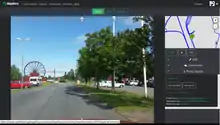Mapillary
Mapillary is a service for sharing crowdsourced geotagged photos, developed by remote company Mapillary AB, based in Malmö, Sweden. Mapillary was launched in 2013 and acquired by Facebook, Inc. (now Meta Platforms) in 2020. This is one of the few alternative platforms that has street level imagery like Google Street View.
 | |
 | |
| Developer(s) | Meta Platforms |
|---|---|
| Initial release | September 2013[1] |
| Operating system | Android, iOS |
| Available in | English |
| Type | Web mapping |
| License | CC BY-SA |
| Website | www |
History
Mapillary co-founders were Jan Erik Solem, Johan Gyllenspetz, Peter Neubauer and Yubin Kuang.[2] According to Solem, Mapillary was founded to allow crowdsourcing of street-level imagery for use with computer vision.[3]
The project started in September 2013,[4] with an iPhone app released in November 2013, followed by an Android app released in January 2014.[5]
Mapillary received $1.5 million in seed capital funding from a group of investors, led by Sequoia Capital in January 2015.[6] In March 2016, it raised $8M additional funding (Atomico, Sequoia, LDV Capital, and PlayFair) for expanded operations, including more computer vision talent and a San Francisco office.[7][8] In spring 2018, the company received $15M investment led by BMW i Ventures for a total estimated funding of $25M.[9]
In September 2018, Mapillary announced a "collaboration" with Amazon to use the Rekognition[10] visual data analysis platform to extract text from Mapillary's huge database of 350 million images. As large cities struggle to manage current street sign inventories, the first major project is identifying parking signs and extracting sign text for one large U.S. city, which will use the data to build a parking app to help save drivers time when searching for parking.[11][12] In October 2018, the company made CNBC's annual list of top 100 start-ups to watch.[13][14] In November 2018, Mapillary released a software development kit (SDK) allowing interested third-party software developers to integrate Mapillary image-capture functionality in their apps, opening the way for additional input channels.[15]
In June 2020, Facebook acquired Mapillary for an undisclosed amount.[16][17] After the acquisition, commercial use of Mapillary was made available free of charge.[18] Due to Mapillary being widely used for contributing to OpenStreetMap and fears that Facebook might shut the service down,[19] a tool was subsequently created for synchronizing data between Mapillary and KartaView[20] (formerly OpenStreetCam). By November 14, over 55TiB or 30 million images had been transferred to KartaView.[21]
In August 2020, Mapillary announced that more cameras will be available for contributors, making possible streetside coverage of more places that Mapillary might not visit.
Features
Mapillary offers different capturing modes including walking, riding (either a bike or car), or panorama. On 10 September 2014, Mapillary announced that they now support panoramas and spherical photos.[22]
As of May 2014, Mapillary had around 0.5 million photos[23] and by December 2014, it had over 5.5 million.[24] As of March 2015 it had 10 million photos,[25] and by June 11, 2015, Mapillary had over 20 million photos, and by August 9 over 30 million.[26] As of February 6, 2016 Mapillary had over 50 million photos.
Mapillary images, millions
Major dataset contributions
In 2018, Mapillary acquired major image datasets from two USA state transportation departments: approximately 5 million images each contributed by the Vermont Department of Transportation[27] and the Arizona Department of Transportation.[28]
License
The images on Mapillary can be used under Creative Commons Attribution-ShareAlike 4.0 International License (CC BY-SA).[29] There is special permission to derive data from the photos for contributing to OpenStreetMap[30] and Wikimedia Commons.[29] The GPX tracks can be used without restriction, and derived data can be used provided it is ODbL.[31]
The license was changed on 29 April 2014 from CC BY-NC to CC BY-SA.[32]
Mobile apps (Android and iPhone) are proprietary software.
Research/datasets
In May 2017, Mapillary released an open source subset of its very large and ever-expanding crowdsourced image dataset, the Mapillary Vistas Dataset of 25,000 street-level images, with pixel-wise annotation, to help train autonomous vehicle AI system algorithms. With data from 190 countries, they described it as "the world's largest, most diverse dataset for object recognition on street-level imagery" and offered it free for both academic and commercial researchers, but licensing is required for commercial product integration.[33]
Mapillary Tasker
On November 28, 2017, Mapillary released a beta tool known as the Mapillary Tasker. Mapillary Tasker "enables a task creator to tell other contributors where help is needed and what needs to be done." On the other hand, contributors can sort through the various tasks listed on the beta and work on whatever projects are interesting and feasible.[34]
The tasks can range from "completing coverage, making map edits based on images, and verifying object detection," and separated between capture, map edit, and verification tasks on the actual tool. As a side note, because the tool is currently in beta, users have to send requests to be reviewed by Mapillary administrators, rather than having the autonomy to post whatever task you want assistance with.[34]
See also
- Google Street View
- KartaView
- List of street view services
- OpenStreetMap
- Web mapping
References
- "Mapillary Founded date". www.mapillary.com. Retrieved 6 September 2018.
- Guzel, Baris (12 April 2018). "Maps, the crucial piece of autonomous puzzle, and our investment in Mapillary". Medium. Retrieved 22 July 2018.
- "Mapillary CEO and founder Solem: "It never really felt daunting…it just made sense"". Red Herring. 2019-10-18. Retrieved 2021-02-01.
- Kristina // Øresund Startups (December 11, 2013). "Jan Erik Solem Launches Mapilary - Putting Images on the Map". Arctic Capital. Archived from the original on 2 April 2015. Retrieved 18 January 2015.
- Metz, Rachel (February 28, 2014). "Putting Crowdsourcing on the Map". MIT Technology Review. Retrieved 22 October 2014.
- Mike Butcher (January 15, 2015). "Sequoia Invests In Mapillary To Crowd-Map The World Faster Than Street View". TechCrunch. Retrieved 18 January 2015.
- Oates, Skift (8 November 2016). "What Destinations Do When Google Maps Lets Them Down". Skift. Retrieved 18 August 2018.
- Lunden, Ingrid. "Mapillary raises $8M to take on Google's Street View with crowdsourced photos". TechCrunch. Retrieved 18 August 2018.
- "A Swedish professor's computer vision startup just raised a $15 million series B led by BMW i Ventures". nordic.businessinsider.com. Archived from the original on 29 May 2018. Retrieved 28 May 2018.
- "What Is Amazon Rekognition? - Amazon Rekognition". docs.aws.amazon.com. Retrieved 2018-09-18.
- Lunden, Ingrid (2018-09-13). "Google Street View rival Mapillary collaborates with Amazon to read text in its 350M image database". TechCrunch. Retrieved 2018-09-18.
- O'Brien, Chris (2018-09-13). "Mapillary will use Amazon Rekognition in effort to ease urban parking crunch". VentureBeat. Retrieved 2018-09-18.
- staff, CNBC.com (2018-10-09). "CNBC unveils its annual list of 100 promising start-ups to watch". CNBC. Retrieved 2018-10-11.
- "3 geospatial companies in the CNBC Upstart 100 list". Geospatial World. 2018-10-10. Retrieved 2018-10-11.
- Carter, Eric (2018-11-08). "Mapillary Open Sources Street-Level Image SDK". ProgrammableWeb. Retrieved 2018-11-15.
- "Facebook acquires crowdsourced mapping company Mapillary". Reuters. 2020-06-18. Retrieved 2020-06-19.
- "Mapillary, the crowdsourced database of street-level imagery, has been acquired by Facebook". TechCrunch. Retrieved 2020-09-15.
- "Mapillary Joins Facebook on the Journey of Improving Maps Everywhere". The Mapillary Blog. 2020-06-18. Retrieved 2021-02-01.
- "the only risk at this moment (apart from privacy concerns) is that Mapillary some day will not let us access the photos anymore". 19 June 2020.
- SviMik (10 July 2020). "Mapillary ⇄ OpenStreetCam synchronization tool". Mapillary. Archived from the original on 2020-11-16. Retrieved 2020-12-13.
- SviMik (2020-11-14). "30549545 images, 55TB total were uploaded to OpenStreetCam". Telegram. Retrieved 2020-12-13.
- Solem, Jan Erik (10 September 2014). "Now Supporting Panoramas and Photo Spheres". Retrieved 25 September 2014.
- Katie Collins (9 May 2014). "Mapillary is the crowdsourced answer to Street View". Wired. Archived from the original on 5 March 2016. Retrieved 4 September 2017.
- "Mapillary on Twitter".
- "10M Geotagged Connected Photos". 2015-03-23. Retrieved 2015-07-21.
- "404".
{{cite web}}: Cite uses generic title (help) - "Vermont Opens Up 5 Years of Road Imagery for Improving Transportation Services". The Mapillary Blog. 2018-03-28. Retrieved 2018-08-20.
- "Arizona DOT uploads 4.7 million street-level images to Mapillary". www.facebook.com. Retrieved 2018-08-20.
- Sweden, Mapillary AB. "Mapillary | Legal". Retrieved 2015-07-21.
- "Mapillary, OSM".
- "Right to Derive Data from Mapillary images".
- "License Update: Now Creative Commons Share Alike". blog.mapillary.com. 2014-04-29. Retrieved 2015-07-21.
- "Mapillary opens up 25k street-level images to train automotive AI systems". TechCrunch. Retrieved 26 July 2018.
- "Introducing the Mapillary Tasker: Collaborate with Anyone on Mapillary". 2017-11-28. Retrieved 2018-01-31.